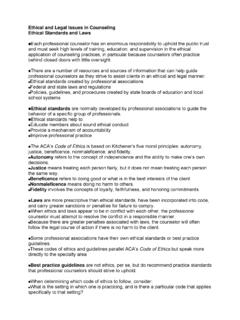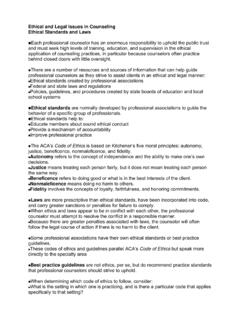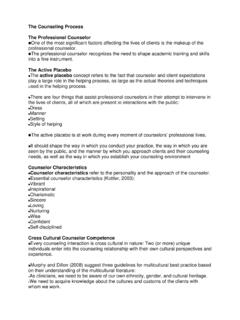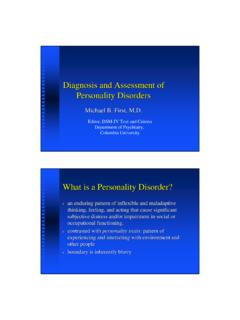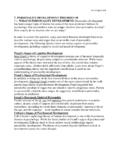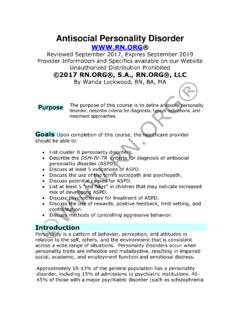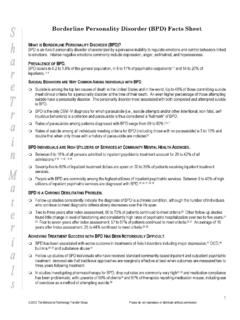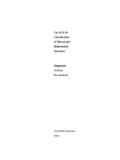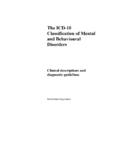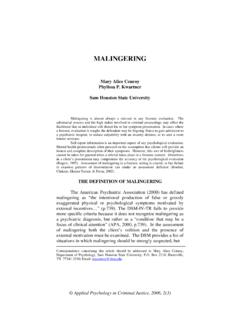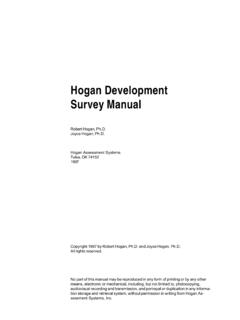Transcription of Assessment, Case Conceptualization, Diagnosis, …
1 assessment , case conceptualization , diagnosis , and Treatment Planning Overview The abilities to gather and interpret information, apply counseling and developmental theories, understand diagnostic frameworks, and engage in collaborative treatment planning are all important parts of the counseling process. Concepts assessment is a broad term that includes many structured and unstructured processes for gathering information to understand the issues that bring people to counseling. case conceptualization refers to how professional counselors understand the nature of clients concerns, how and why the problems developed, and the types of counseling interventions that might be helpful.
2 diagnosis is the identification of a problem which becomes the target of the counseling intervention. Treatment planning provides a road map for the counseling process. Treatment plans identify what the professional counselor and client are going to work on together and what strategies will be used to achieve these goals assessment assessment is the process of gathering information in a systematic way to evaluate concerns or questions that a client brings to counseling. assessment includes: Intake interviews Tests and inventories Behavioral observations Relevant information gathered from other sources assessment The assessment process informs diagnostic formulation and counseling plans, and helps to identify resources that could help the client better cope with the presenting concern.
3 Determining what information to gather is an important assessment skill Testing and the Counseling Profession The terms testing and assessment are often used interchangeably; however, testing is only one type of assessment tool. It is important that counselors: Are sensitive to the appropriate use of tests and vigilant about discriminatory practices in testing Are attentive to cultural biases in tests and only use tests with norms developed on a sample that is representative of the test taker Are sensitive to an over interpretation of test results, understanding that a test provides a limited sample of behavior Ensure that test results are not used to unfairly disadvantage the test taker Testing and the Counseling Profession The use of some tests is regulated by test makers and the purchase of these regulated tests requires advanced levels of education and training.
4 assessment Tests are often categorized by publishers as level A, B, or C. Level A tests are those that require no special training to purchase and administer Level B tests require a master s degree, relevant testing coursework and supervision in the use of the test Level C tests require a doctorate or a license with a scope of practice to interpret these tests and training and supervision in the use of the instrument Categories of Tests Tests are often categorized as: Standardized or nonstandardized Norm-referenced or criterion-referenced Cognitive or affective Standardized Tests Standardized tests have defined protocols for administration and scoring.
5 The test is administered in the same way, under similar conditions whenever it is administered The methods used for scoring the test are predetermined and are followed consistently. Scores from a standardized test are interpreted in relationship to either a norm group ( , a group of people that are similar to the test takers in such dimensions as age, gender, grade) or are measured against some performance criteria Norms and criteria used for scoring standardized tests are developed through extensive test administration and statistical analysis Nonstandardized Tests Nonstandardized tests do not have defined administration protocols and have not been extensively studied to create norms or criterion-related scoring protocols.
6 Norm-Referenced Tests When scores on a test are compared to the scores of a group of people with similar characteristics to the examinee who took the same test, the test is considered a norm-referenced test. That comparison yields a derived score (standardized score or percentile rank) that places individual scores in relationship to the test norms Criterion-Referenced Tests When you take a test and the score is based on performance criteria, you are taking a criterion-referenced test. Your score will likely reflect the number of items answered correctly and some criterion, such as a grade or percentage score, will be agreed upon Cognitive Tests Cognitive tests include intelligence tests, other aptitude tests, and achievement tests.
7 Intelligence tests are designed as broad measures of cognitive ability. While there is ongoing controversy regarding the validity of the constructs that underlie intelligence tests (for example, is general intelligence a useful concept?), it is essential that professional school counselors be familiar with these tests assessment Intelligence tests are correlated to academic achievement and are often used to make educational planning or screening decisions Intelligence tests are considered to be one type of aptitude test. However, aptitude tests also measure a broad range of more specific cognitive abilities or the ability to master particular skill sets.
8 Aptitude tests are often used to help students understand personal strengths and challenges, and by employers to help in the hiring process Achievement tests are typically used in educational settings and are designed to measure student learning. Individual achievement tests that measure specific areas of achievement (such as reading or math) are used diagnostically by learning disability specialists and school psychologists Affective Tests Affective tests include: Personality inventories Interest inventories Symptom checklists They are used for the screening and diagnosis of clinical issues.
9 Personality tests and personality inventories are designed to measure personality traits, temperament, and levels of pathology. These tests are categorized as objective or projective. Objective personality tests are paper and pencil tests that require examinees to answer questions in specific ways (such as multiple choice) and can be easily scored Projective personality tests provide examinees with ambiguous tasks and examinees answers can be quite varied Symptom checklists measure the presence and intensity of symptoms associated with various problems or disorders. While a diagnosis should not be made solely on endorsed items in a symptom checklist, they are valuable assessment tools They are also used to monitor the effect of treatment on symptom reduction Qualities to Consider When Evaluating Tests There are several qualities that help professional counselors decide if a test is a useful tool to administer and how much consideration to give to a test score: Is this test accessible?
10 Is the test psychometrically acceptable? Is this test clinically useful? Is the test appropriate for client use? assessment It would be important for the professional counselor to know the reliability and validity of scores derived by the inventory. Validity refers to how well a test measures what it is intended to measure Reliability refers to the consistency of scores the test provides Types of Validity In classical test theory, score validity is frequently described as three types: content validity, criterion-related validity, and construct validity. Content validity refers to how well test questions represent the domain being tested.

